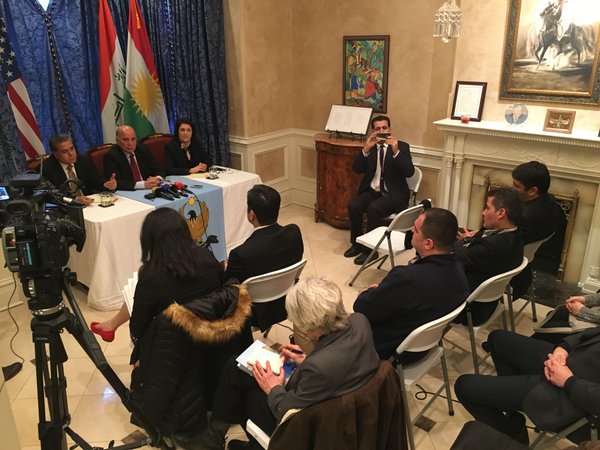Washington Kurdish Institute Jan 18, 2015
On Jan 17, 2016 the Kurdistan Regional Government’s (KRG) Representation to the U.S. hosted a press conference for Dr. Fuad Hussein, the Chief of Staff of Kurdistan’s President and Mr. Falah Mustafa, KRG’s Minister of Foreign Relations, moderated by Ms. Bayan Sami Abdulrahman KRG’s Representative to the U.S. During the press conference the delegation addressed the purpose of their visit to Washington and briefed the participants about the current economy and security situation in the Kurdistan region.
During their stay in the U.S., the KRG’s delegation held meetings with several U.S. officials at the White House, Department of State, Congress, and Pentagon. “We met with members in armed services, foreign relations, and finance committees, both at House of Representatives and Senate,” said Dr. Hussein. He added: “we held meetings at almost all the bureaus at the State Department and we met with National Security Council members and advisers for the U.S. President and the Vice President.” In addition the delegation held a meeting with Gen. Lloyd Austin, commander of the U.S. Central Command, in Florida.
The economic situation facing Kurdistan and the war against ISIS terrorists were the main topics for KRG’s delegation. He explained that “some challenges are seen as threats to the region.” “We wanted to tell the U.S. officials about these issues and see how they would help us,” said Dr. Hussein.
On the economy, Dr. Hussein explained that former Iraqi Prime Minister Maliki stopped sending KRG’s allocated budget in February 2014, then ISIS took over Mosul in June of the same year; afterwards ISIS terrorists launched their attacks against the Kurdistan region in August 2014. He stated, “On one side there was no money coming from Baghdad to Kurdistan and on the other side there were a great amount of war expenses on us.” He stressed that the large numbers of refugees and internally displaced people (IDP) fleeing violence to Kurdistan contributed to the financial crises. He said, “Now we are hosting 1.8 million IDPs and refugees in the region,” stressing that a large number of people need great amount of financial support.
According to Dr. Hussein, the KRG started exporting 150 thousand barrels of oil a day when the oil prices were around $100-110 per barrel. He said, “the KRG could increase the amount of exported oil to 550-600 thousand a day but oil prices went down to $29 as of yesterday.” “This [drop of oil prices] creates a big crisis,” he added.
Responding to a question about whether the delegation raised the IDP issue with U.S. officials, Mr. Falah Mustafa said: “this was part of our discussions. We are proud of the people of Kurdistan, who have opened their doors and their homes to accommodate the needs of these people but the situation is becoming more dire, the number of the displaced people is higher than the capacity of the KRG to deal with. The U.S officials all commended the people and the government of Kurdistan for welcoming these people. They also stressed upon the fact that they will be doing their best in order to encourage the donor countries and the United Nations to be our partner in dealing with them.”
Dr. Hussein expressed that if the financial crises continues in the Kurdistan region, it will affect the fight against ISIS terrorists. He said: “Peshmergas will not be able to continue fighting ISIS while their families are hungry, because they have not received their salaries.” He added, “There is a great sympathy by the U.S. toward Peshmerga and we hope they will be able to help us after we explained the financial situation to them.”
During a question about the U.S. role in Kurdistan, Mr. Falah Mustafa said: “we came to Washington to express our thanks to the U.S. for their support and for their immediate response to create a coalition to fight ISIS.” Further, “we also are thankful for the humanitarian support by the U.S. to the Kurdistan region.”
Mr. Mustafa briefed the media that the KRG seeks financial and weaponry support from the U.S. He said, “all the officials responded positively about our requests and said they will discuss ways to provide help.” “Some officials admitted their knowledge about the crises facing Kurdistan,” he stated.
Also on security, Dr. Hussein said: “U.S. led coalition forces will arm two Peshmerga brigades within a month or two.” The U.S. led coalition is planning to support and arm 10 Iraqi army brigades and two Peshmerga brigades to help Iraq during their fight against ISIS terrorists.
The Washington Kurdish Institute asked Mr. Falah Mustafa if the KRG is still seeking direct arming for their fighters. He replied, “As the KRG, we would like to receive arms directly for the Peshmerga forces [from the U.S.-led coalition] but during the existence of greater crises in the region, the important element for us now is for the weapons to be delivered to our forces [whether directly to us or through Baghdad].” “The U.S. and other European counties in the coalition forces have promised us that Baghdad will not prevent the deliveries of any weapons [to Peshmerga forces] sent for the fight against ISIS,” he added.
The Kurdistan region’s Peshmerga forces and government employees have not received their salaries in the past three months due the financial crises facing the region caused by the drop of oil prices and the ISIS war.


